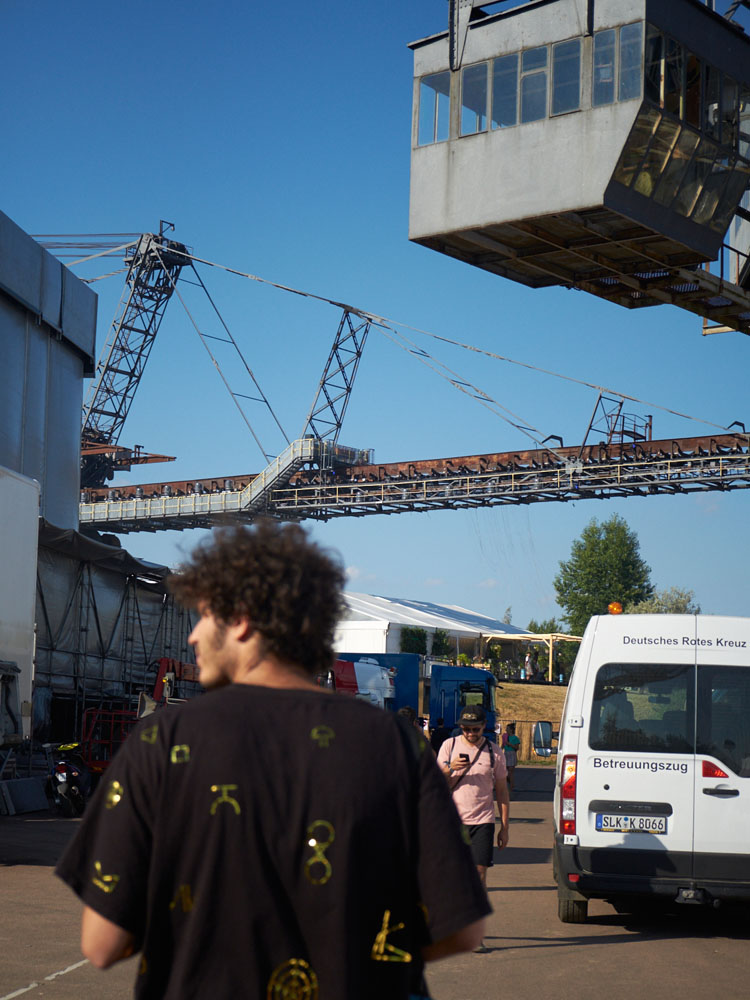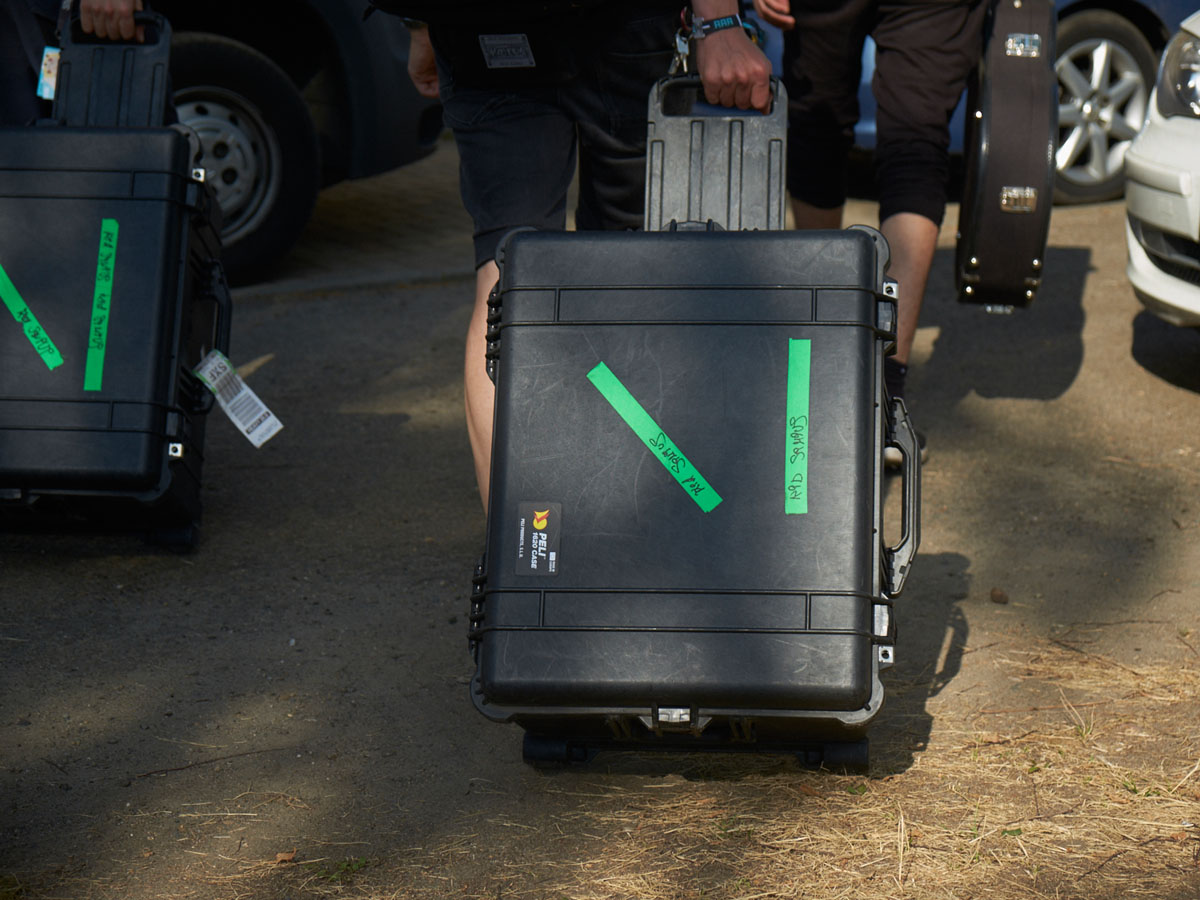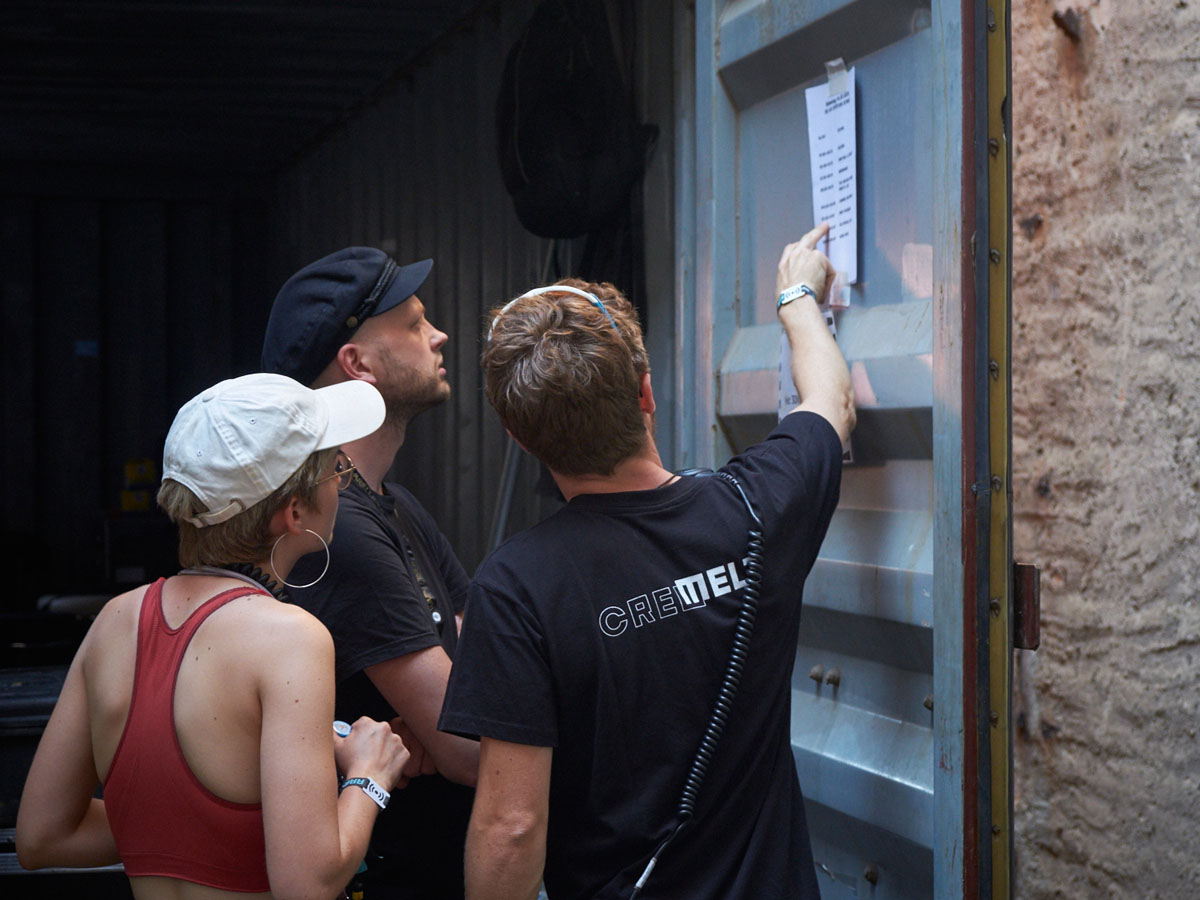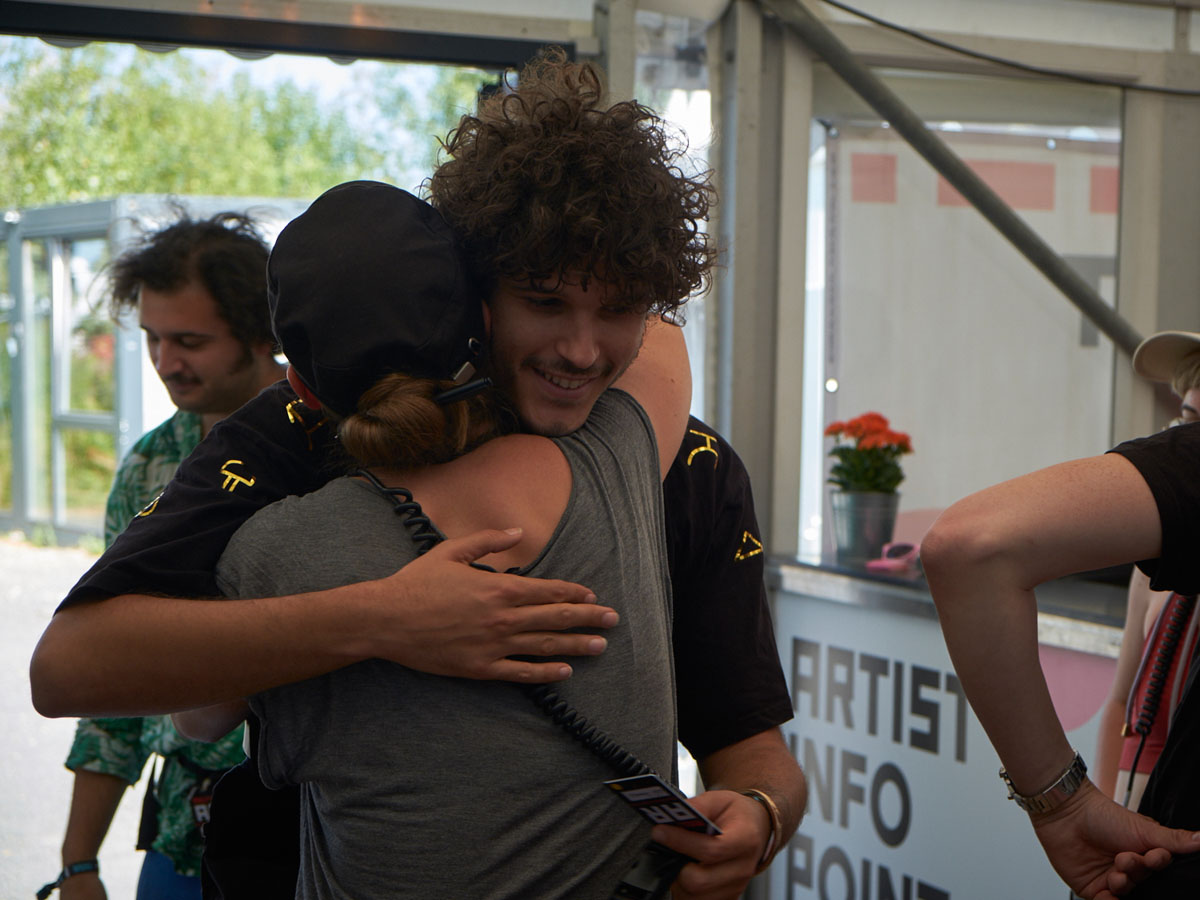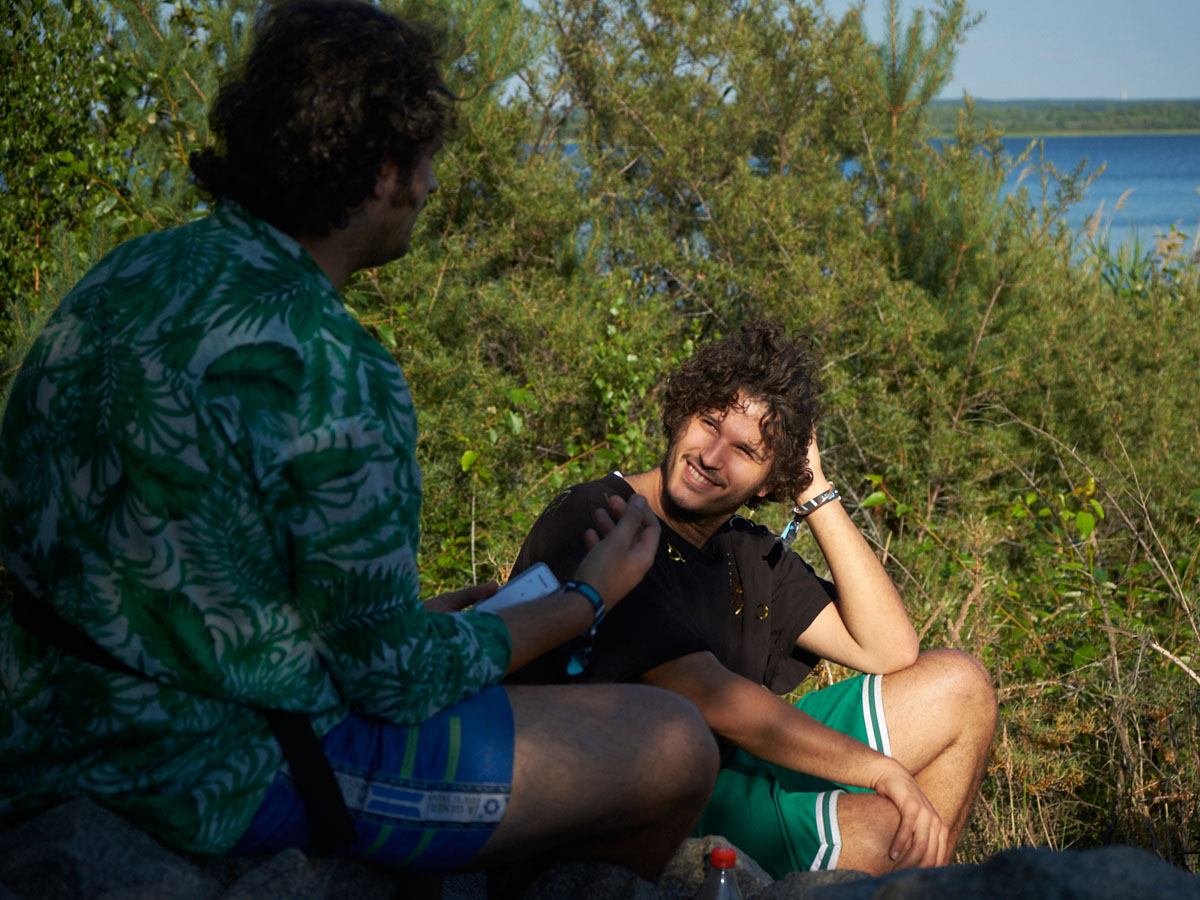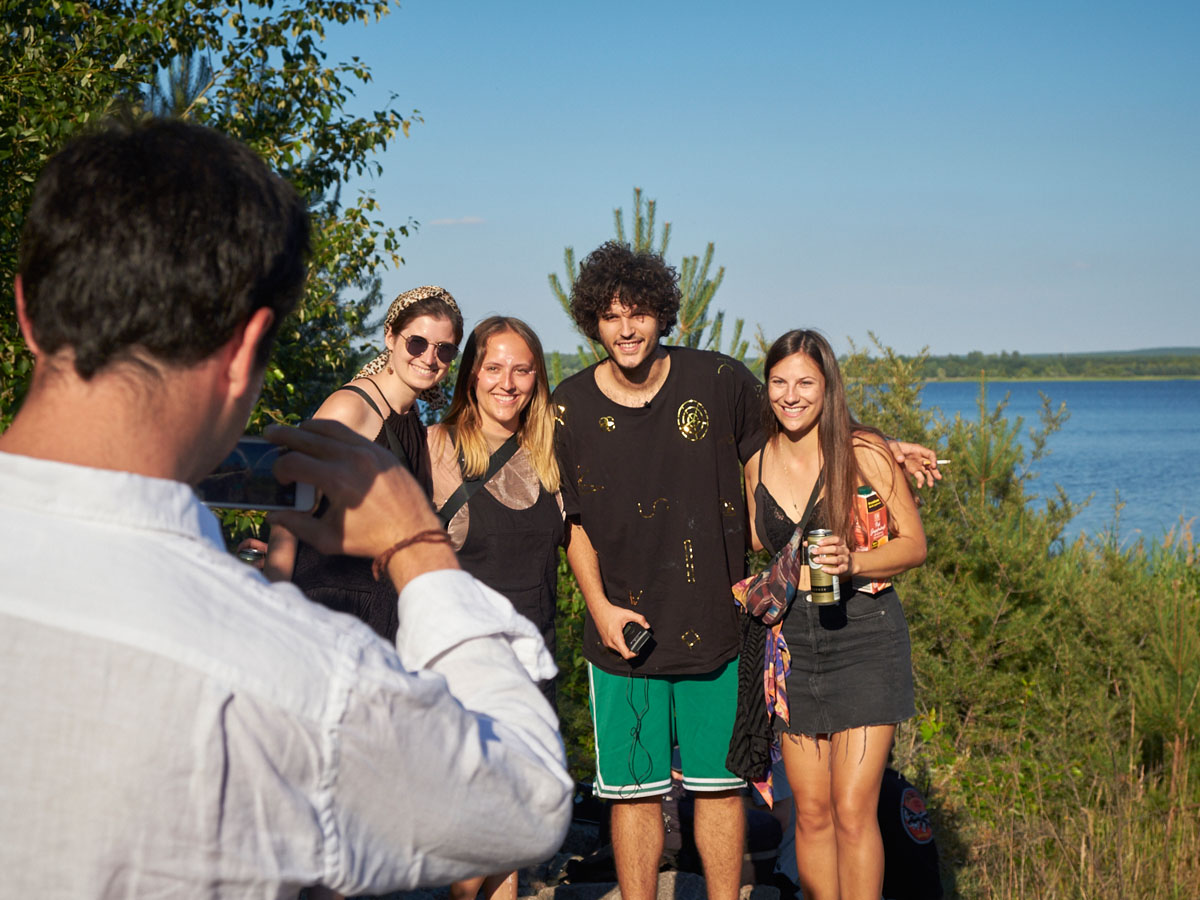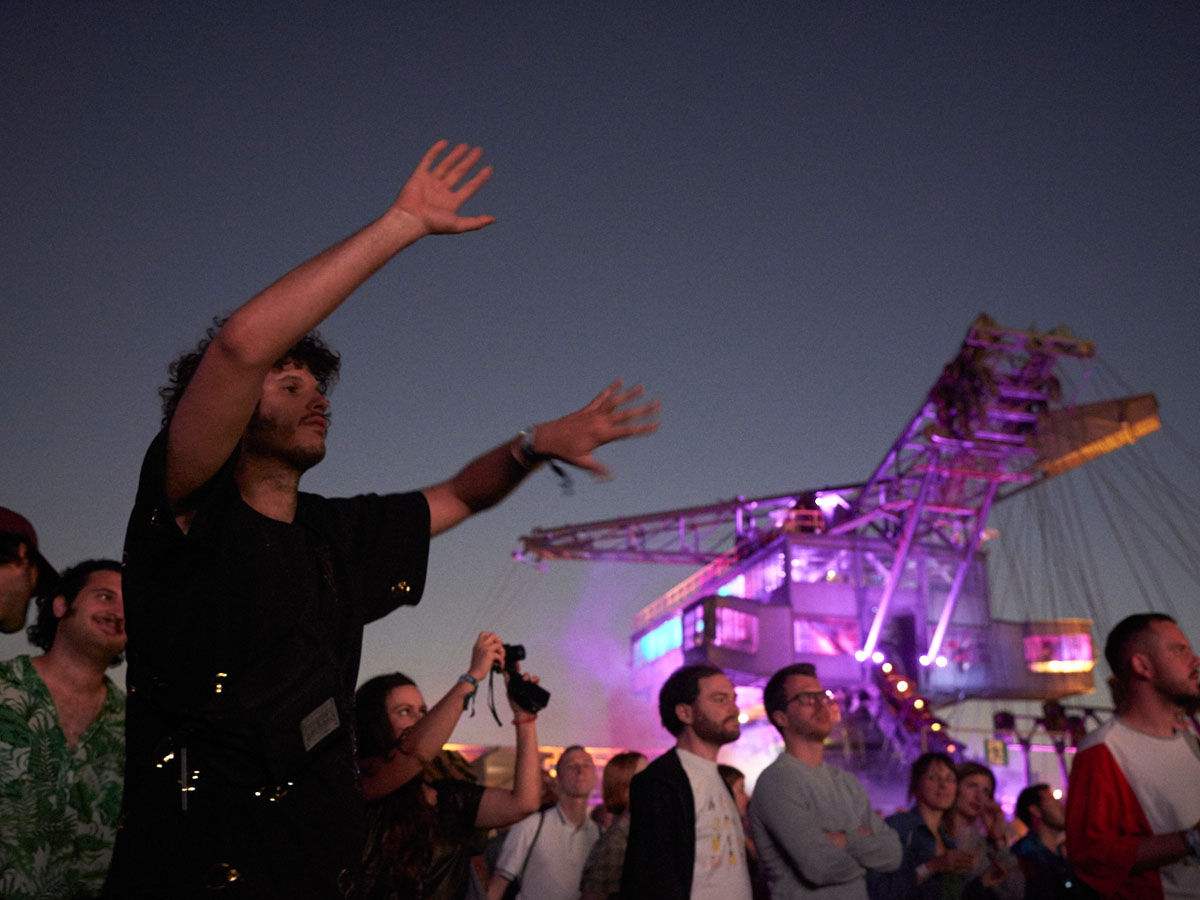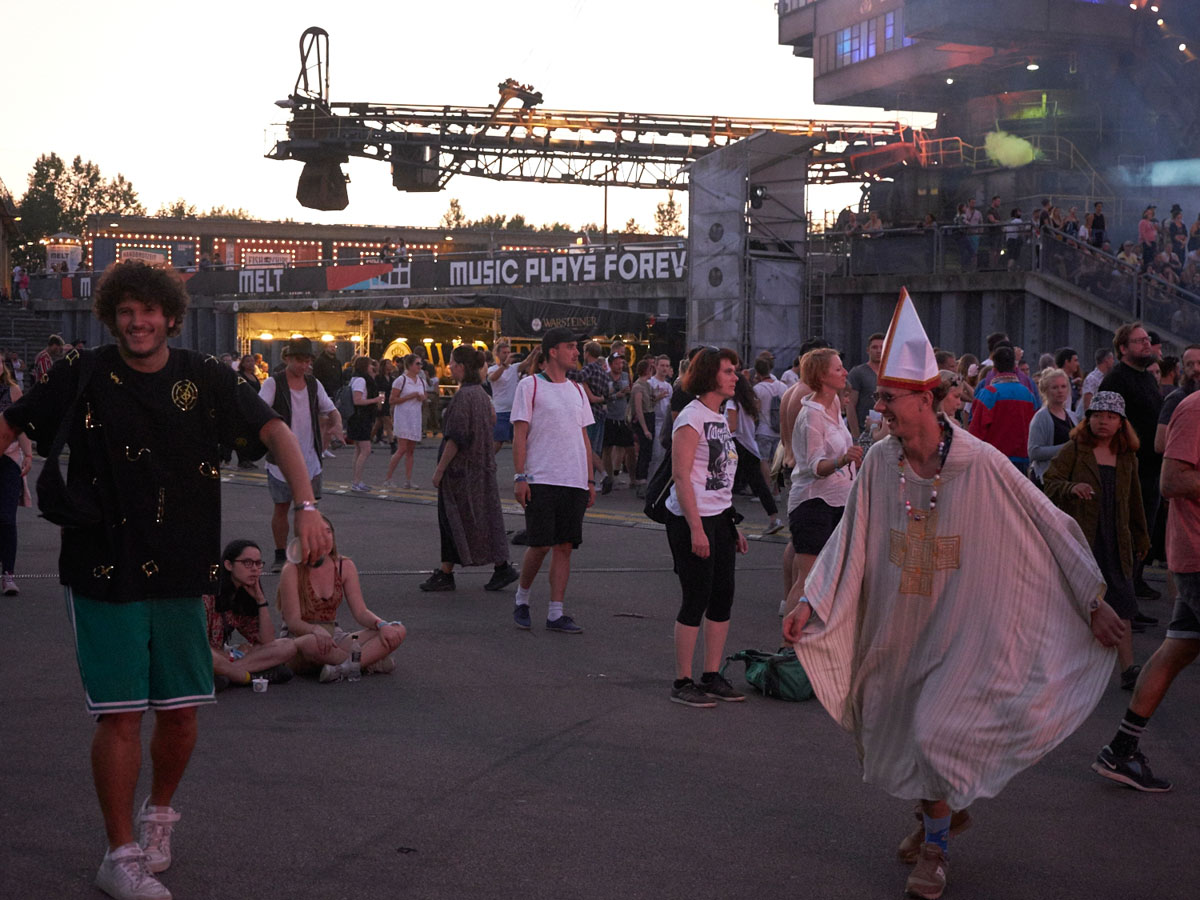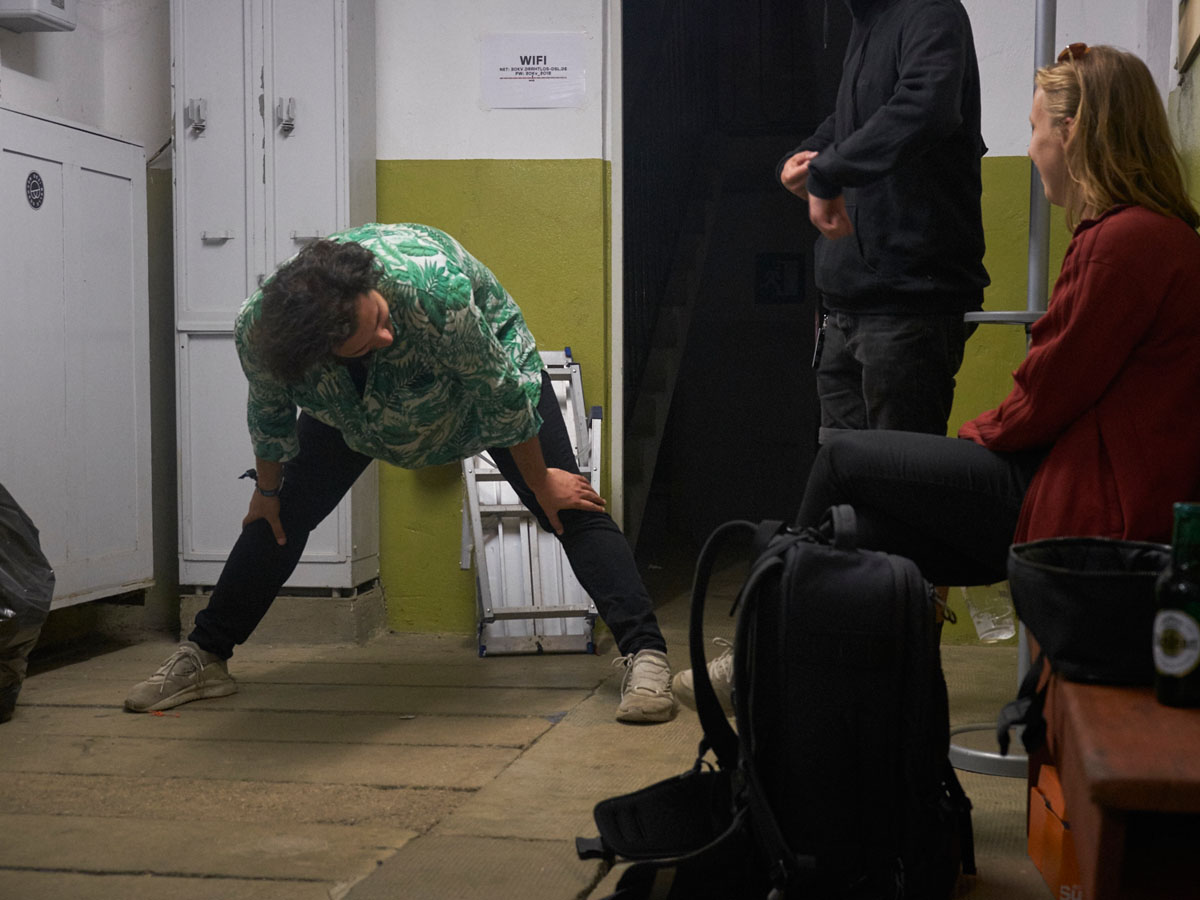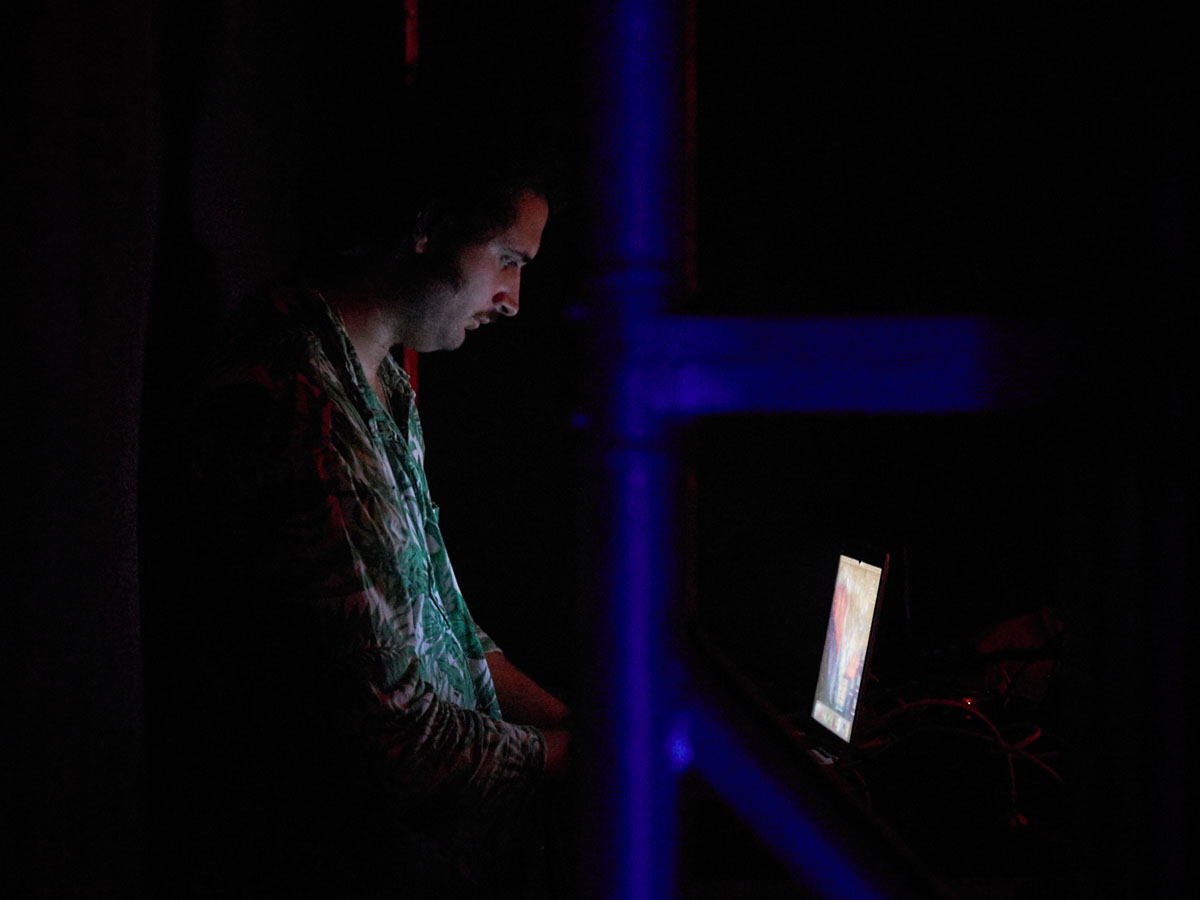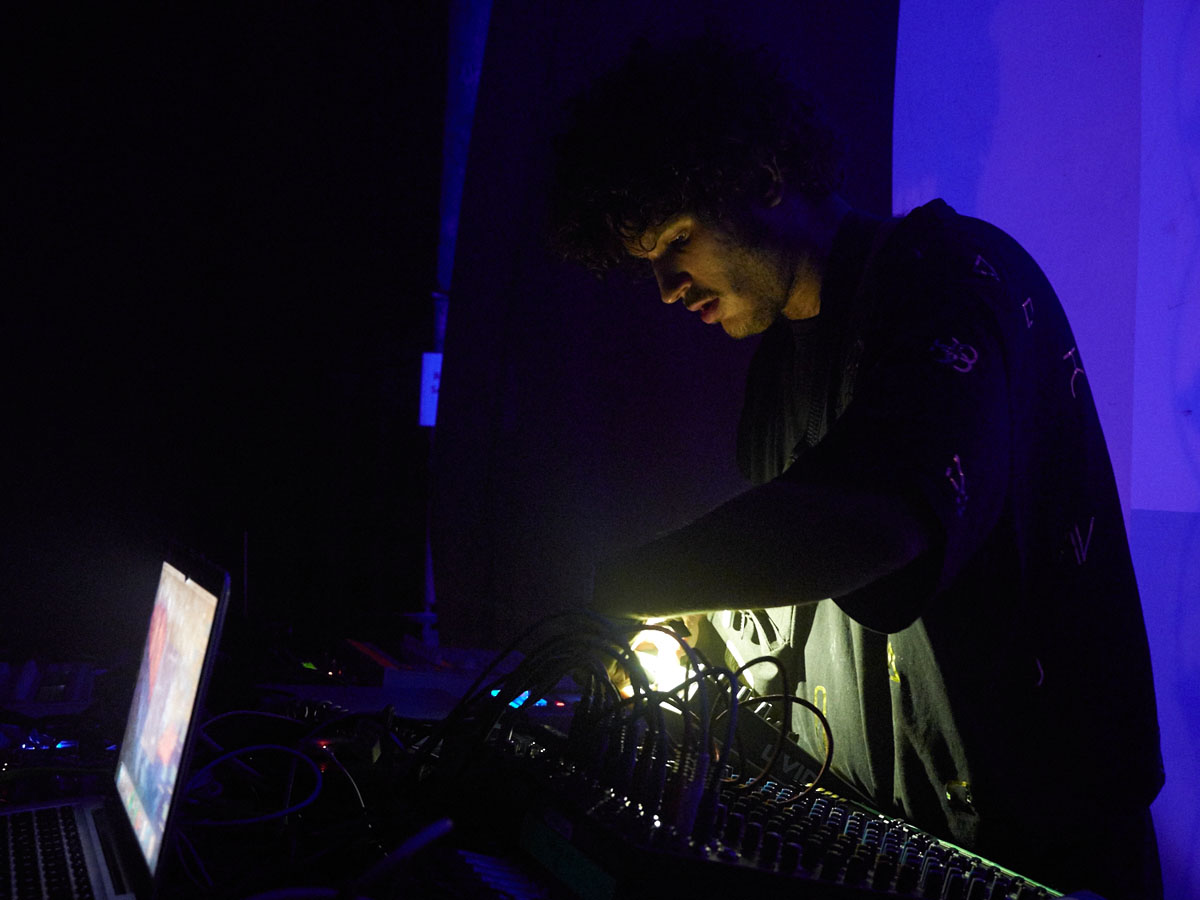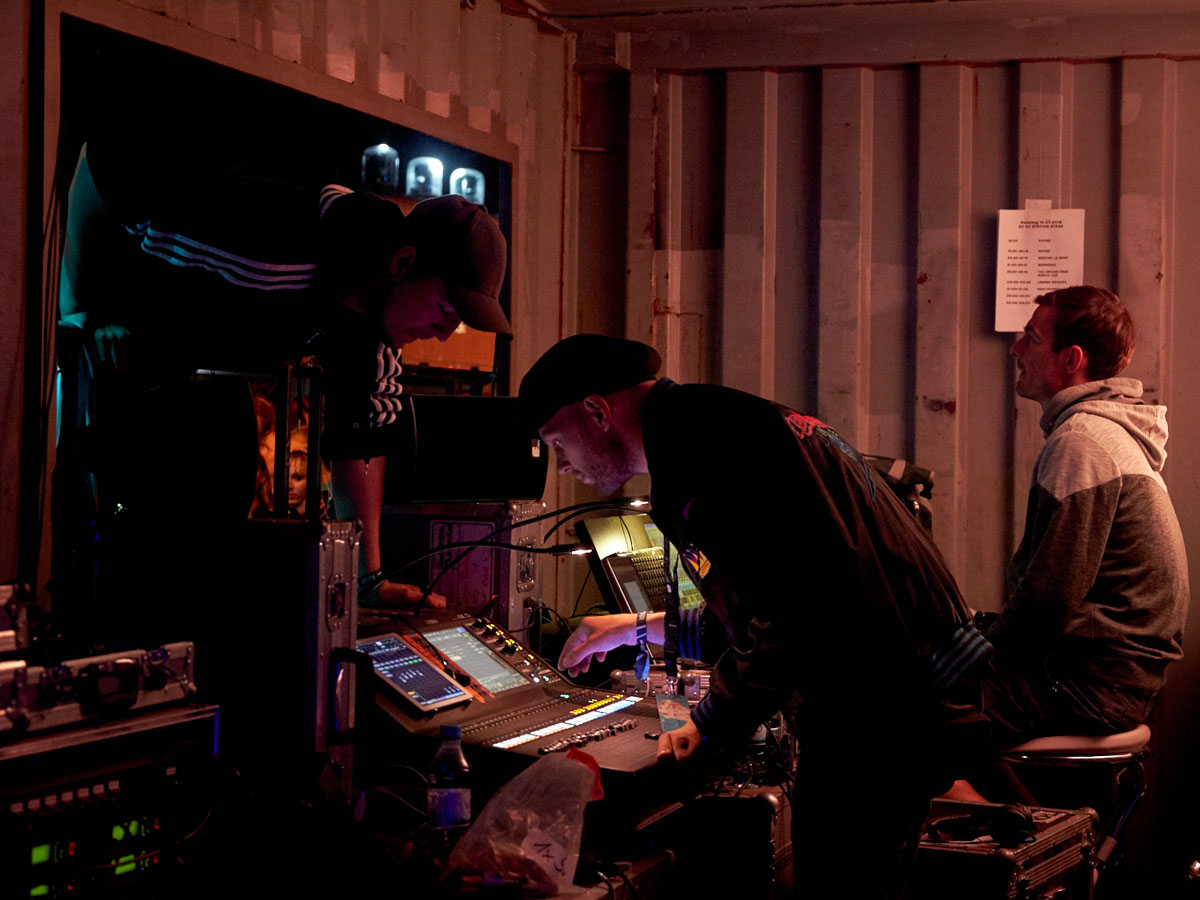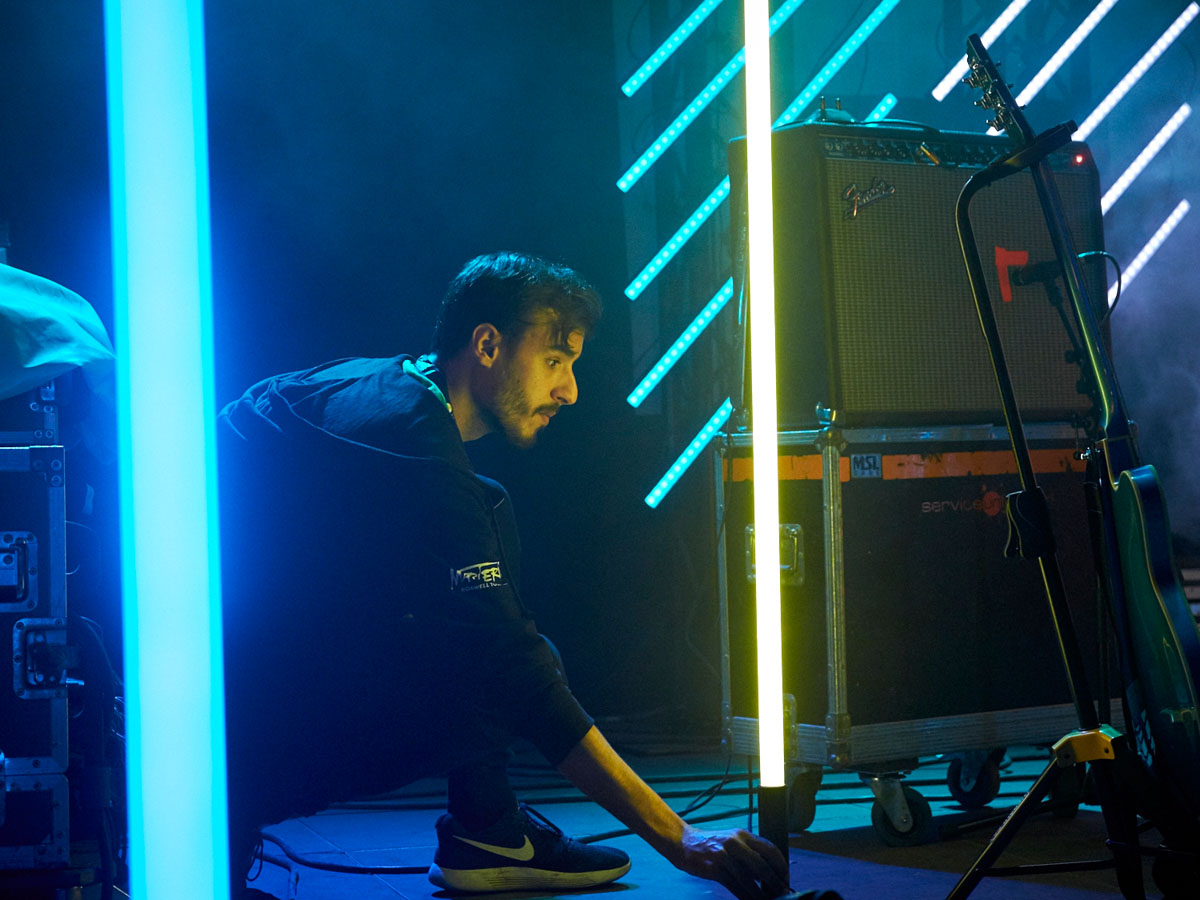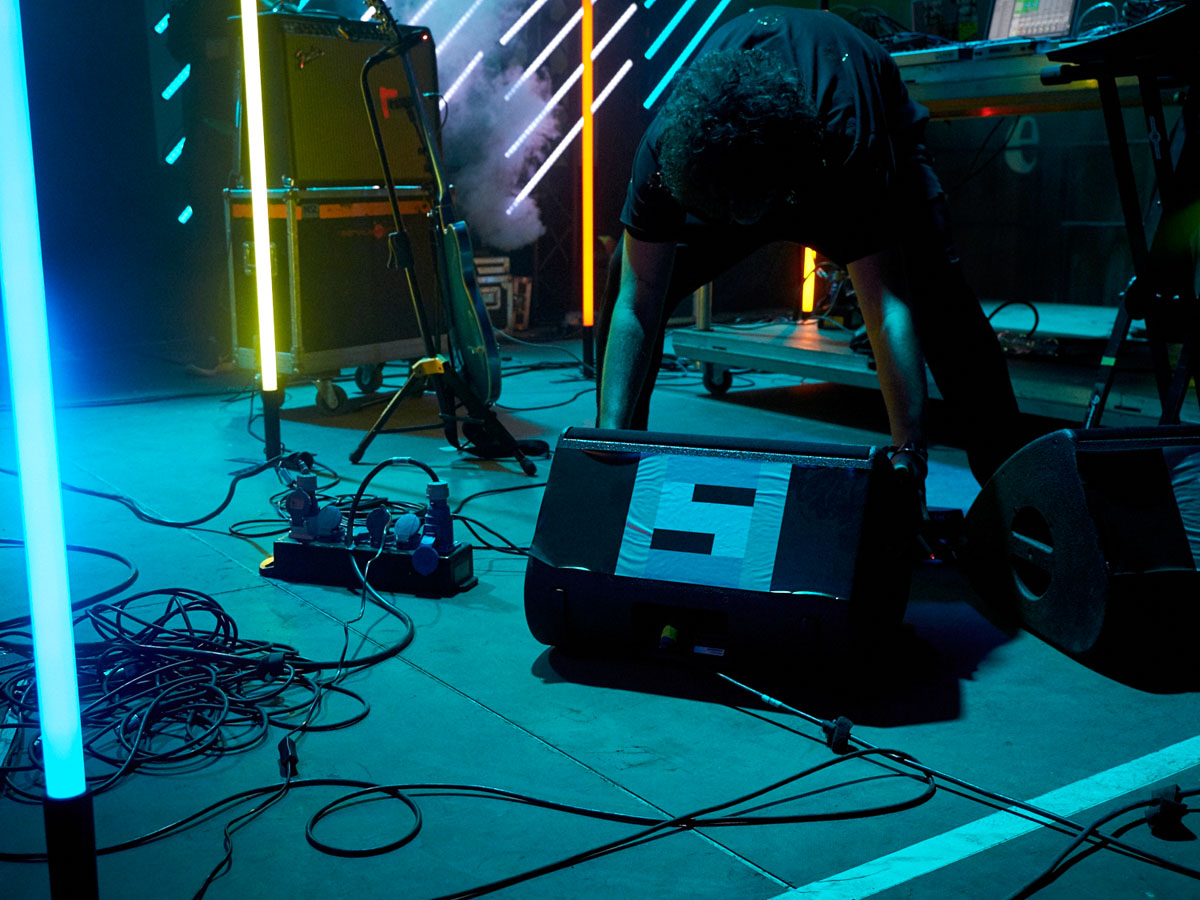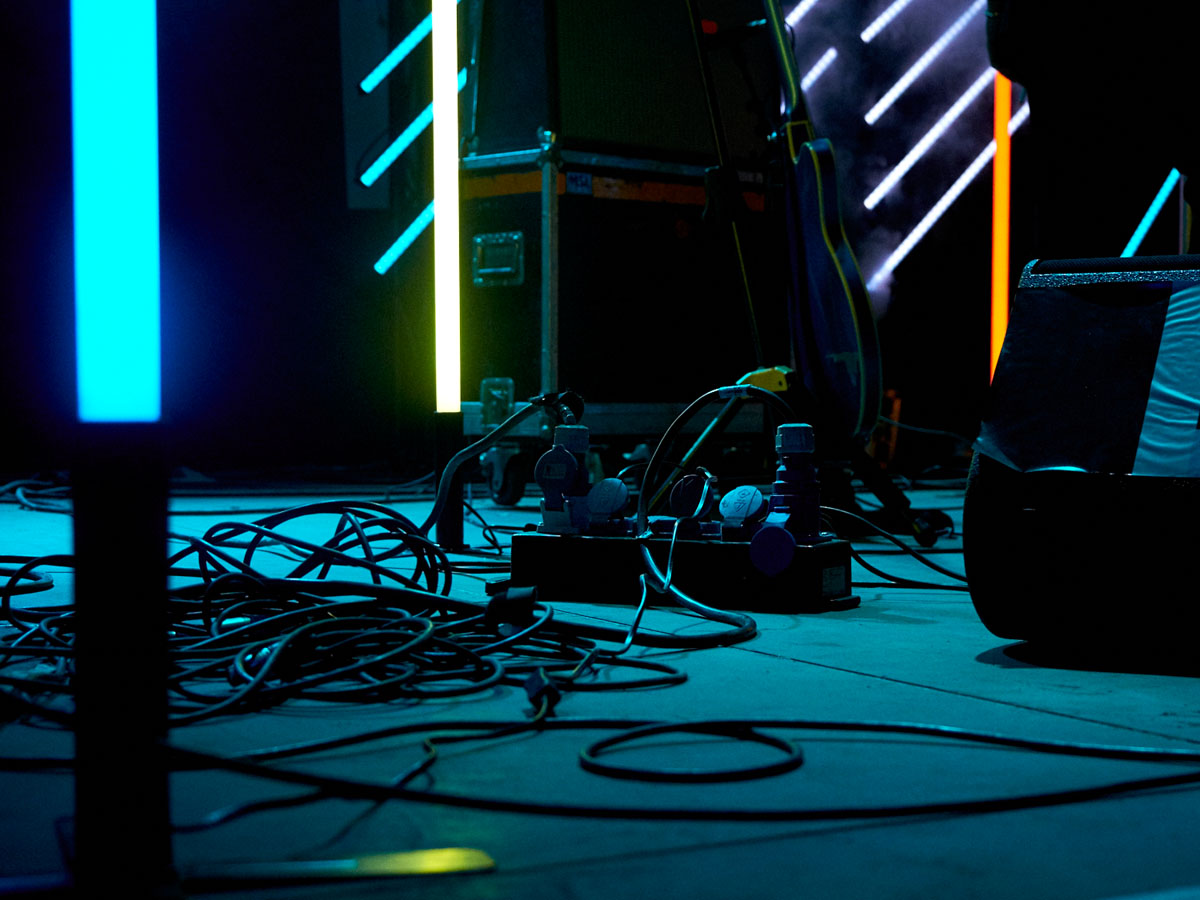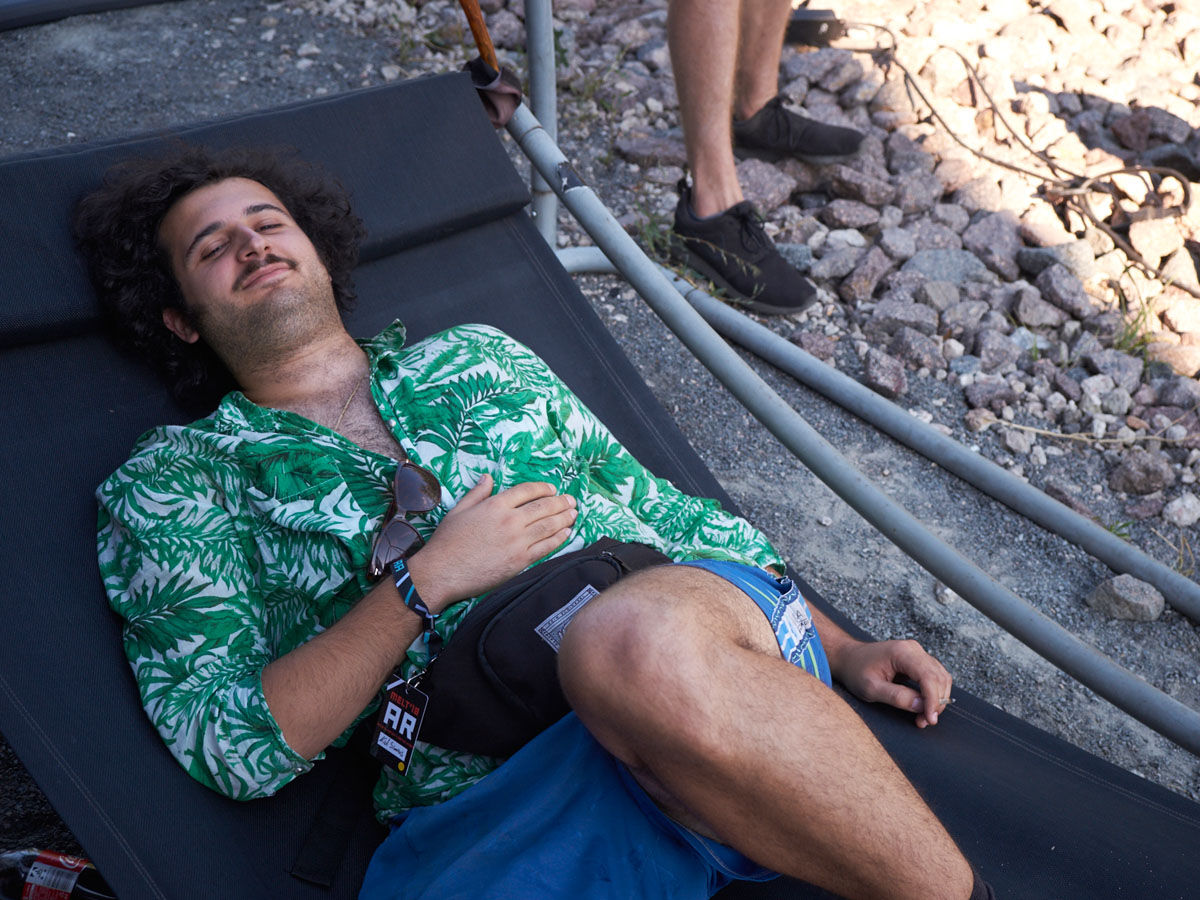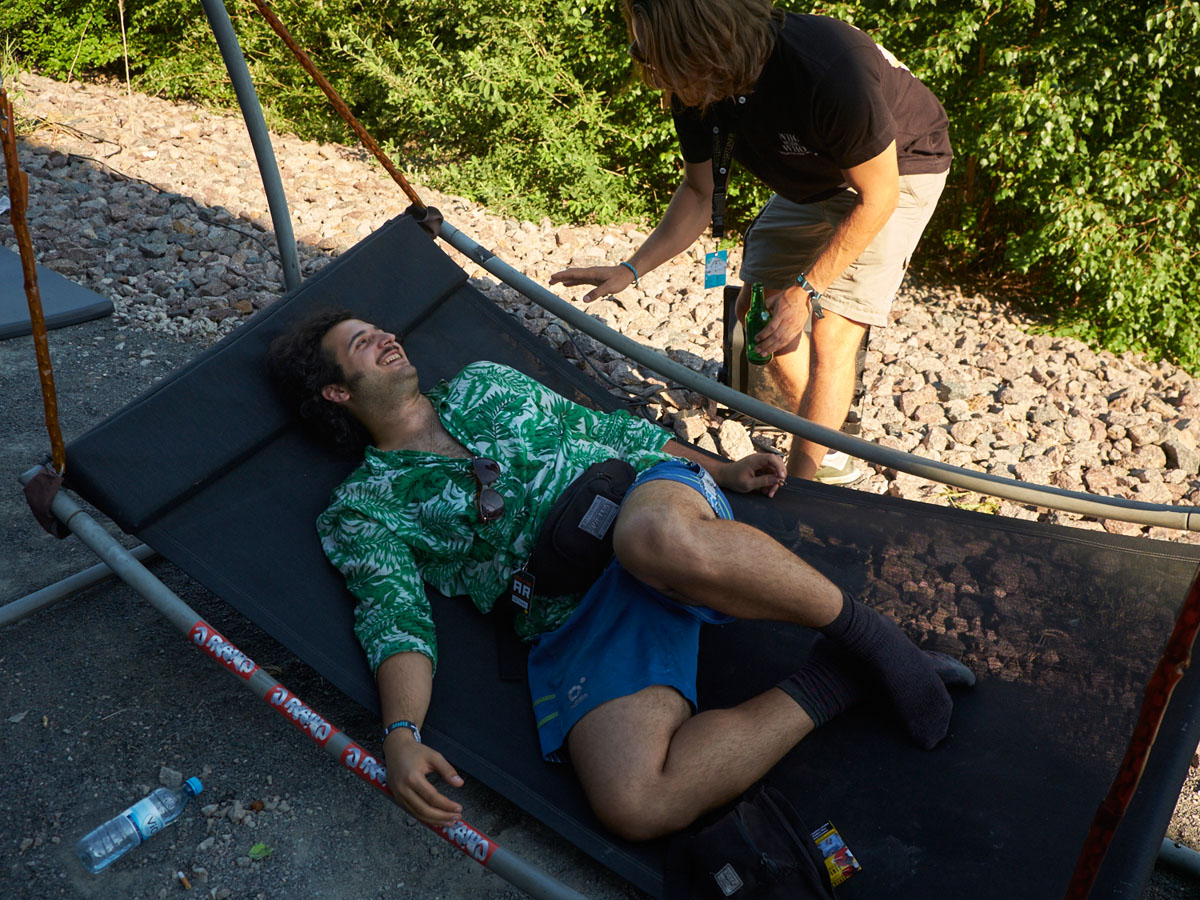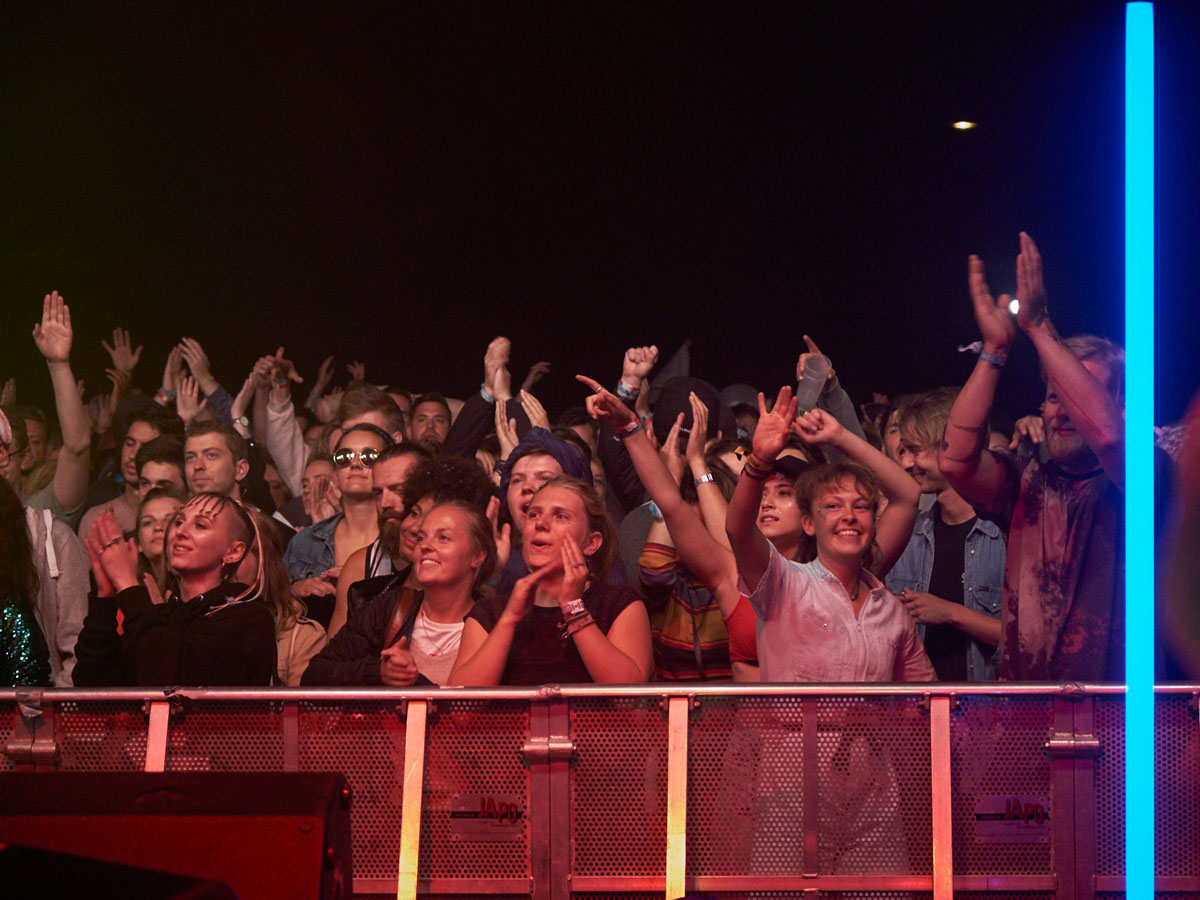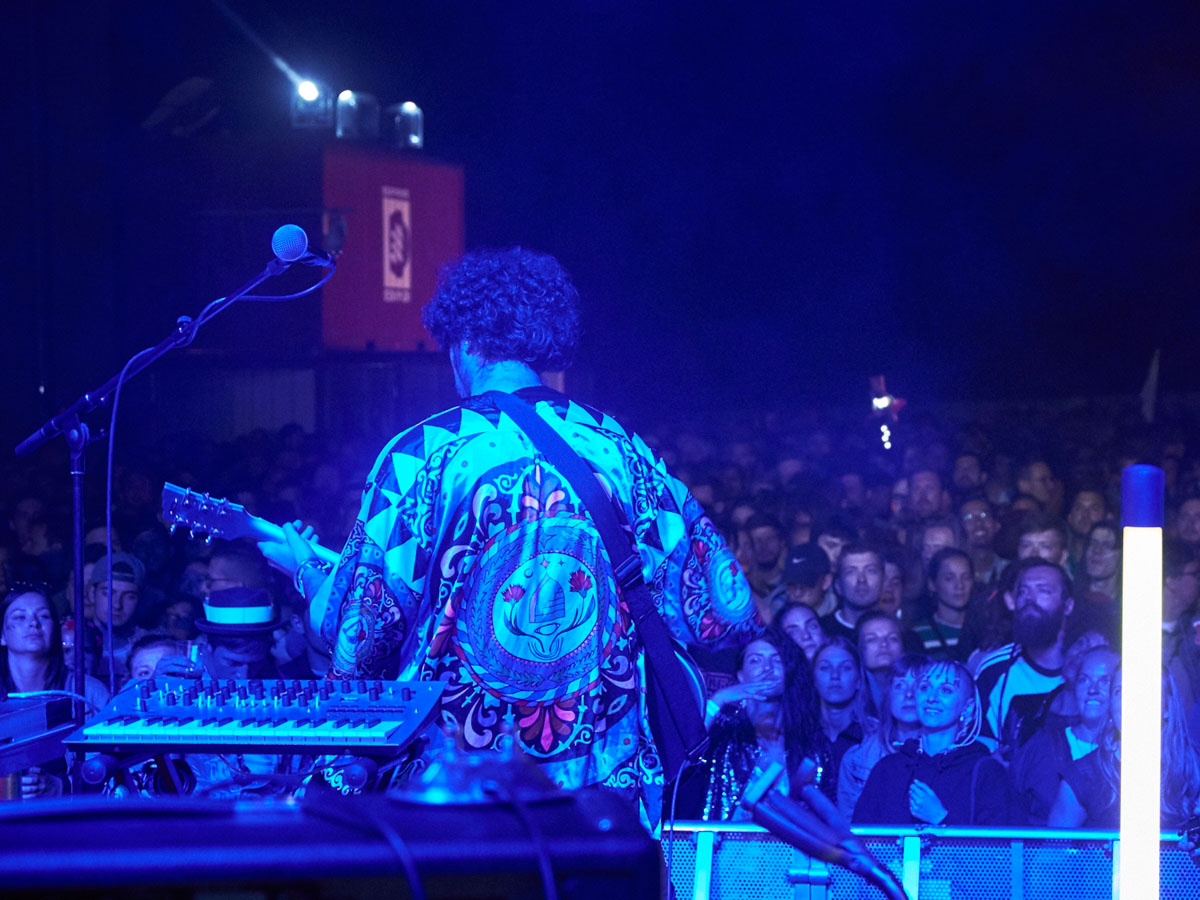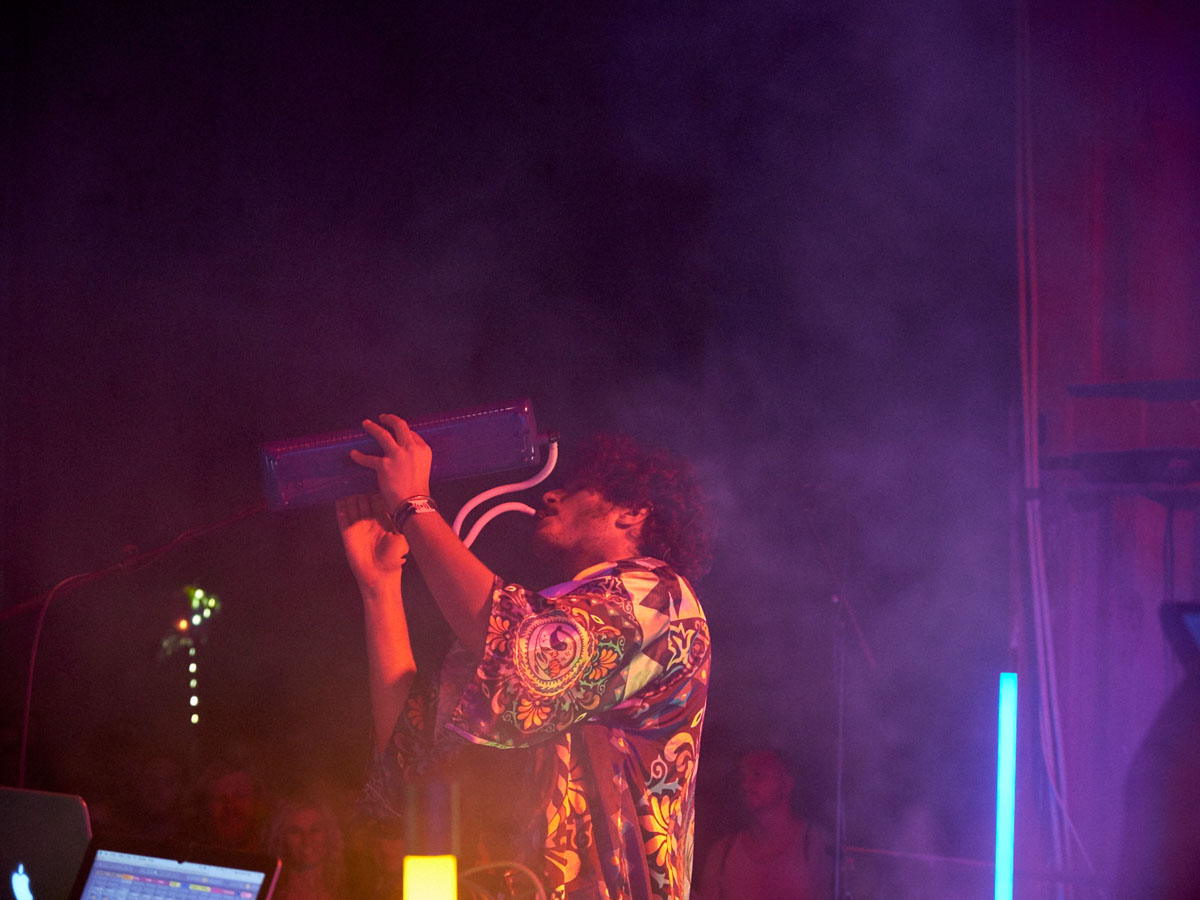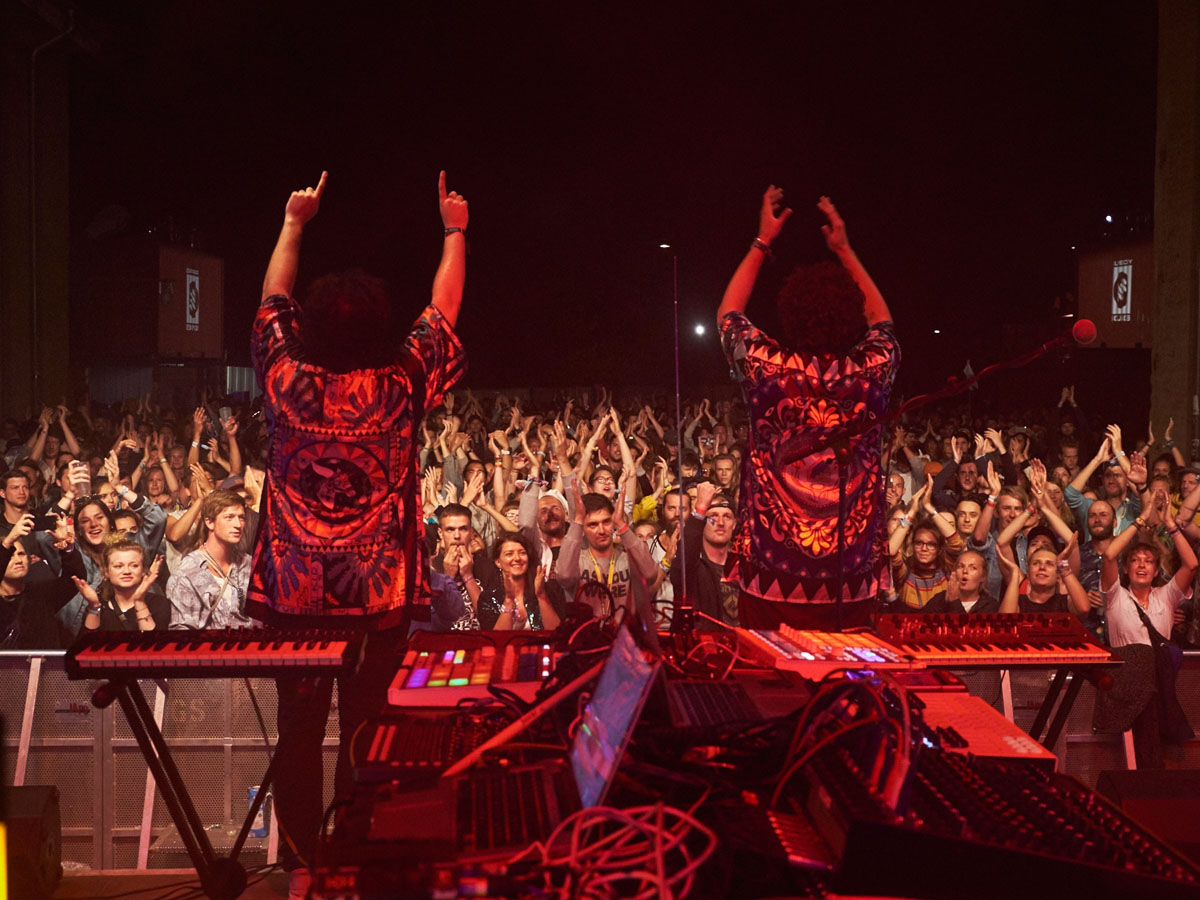José Antonio García Soler aka Kid Simius is moving quite fast these days. On his way towards the world's big stages and shortly before the release of his new album Planet of the Simius, we followed him around at this year's Melt Festival, and sat down for an in-depth interview.
concept & interview Johannes Jacobi
editors Freddy White & Sascha Krautz
photography Sascha Krautz
video Karsten Boysen
We’re at Melt Festival and it’s the third time you’re playing here. 2013 was your first. When they announced you in 2013, did you know about the festival beforehand?
J: Yes, of course! At that time I was working in the Wrangelstraße and I saw the lineup in the streets and I was like: „Fuck, I need to play there!“ But of course I was not expecting that, so I was really, really happy when I first heard about it.
How was the first time here?
J: It was really cool because it was the Melt preparty and it was the only stage that was open, and for me, as a newcomer it was amazing because I had the chance to play in front of a lot of people. I also met the Crystalfighters, they played after me and I got the chance to go on tour with them a couple of years later in Spain. It was nice, but I was also really, really nervous.
You’re here for the third time, is it different to an average show? Because there are maybe more people that already know you.
J: Yes, Melt Festival is an important festival if you make electronic underground music and every cool artist is playing there. I guess I’m a bit more nervous than on a regular show, but even if there are only three people there to see us, we still want to make the people happy, you know? But I noticed, for example when I arrived backstage, I met a lot of people I already knew. Old friends and people I already played with at other festivals like whomadewho, and also the people working at Melt. It just feels very familiar to me somehow.
In 2013 and 2014 I was more like „Oh look at this and look there and oh, that's him!“ I was just more like a fan. I still think that it’s important to be a fan, no matter how often you play, you still have to be surprised by music, and just enjoy it in general.
Sometimes it could get really professional. Like going to the office for a regular job.
Are you afraid of losing it sometimes, like getting numb?
J: Yes, of course. Sometimes it could get really professional somehow, like I’m a musician and this is my job, I do this show, like going to the office for a regular job, and I don’t want to have this. I want to be happy about every show I play. People are still very excited to see me live and this makes me happy. Being on stage and playing in front of a lot of people is a big responsibility. I try to enjoy it every time.
J: Sometimes, for example, when you’re in the studio, you have the fear that you only do certain things because you think that people will like it more. But if that's what you’re thinking about, you’re lost, man.
In the end, I want to have the same feeling that I had when I started making music when I was 16 years old. Being curious about new things and to make new stuff and just have no fear. Fear is really bad.
Did you have a situation where you got to that point, and what did you do to get the excitement back?
J: Not really. Sometimes I think about that. You spend the whole day in the studio and everything you did was crap. Then you’re like:
J: Oh fuck, next year is going to be crap, I won't be able to pay my rent, I can’t feed my family, you know? The pressure and the responsibility are getting bigger every time but I just let it go. I just don’t deal with it. I try to have fun the whole time.
What was your best festival show so far?
J: That's a very difficult question. Two weeks ago we had like 3-4 amazing shows. The first amazing show was at the Maifeld Derby in Mannheim. I love this festival, I love the people, I love the people working for that festival, I love the lineup and this was the third time we were playing there and it was great. You could see that the people who are there are really interested in your music and are having fun and it was really unique and special. I also played Fusion Festival. It was really big and a lot of people came to see us and after the show, we were like:
What the fuck?! That was not normal.
M: Also, the show in Poland. Tauron Nowa Muzyka. The people really did got nuts during the show and had a lot of energy. It also wasn’t that late at night, more like nine or ten and you can feel the difference when it’s not that late. When you play at like 3 a.m. you can kind of feel that the people are tired, even though they enjoy the show.
J: And the Feel Festival as well. We had the chance to have our own lineup for 12 hours on the Manege Stage and we made a Kid Simius and friends show. Miguel also played with his project Kilnamana and we invited Sophia Cortez and a lot more, and we just made it really familiar. We still didn’t expect so many people that wanted to see us. We were also proud of ourselves because we delivered something special.
What is the absolute worst case scenario for a show?
M: Bad catering! But also when the weather is not good. That would take down the mark for the festival, even though the show was great.
J: For us, the technical stuff is really important. We have to feel comfortable on stage, the stage manager has to really care about us. I can also understand that if you’re working like three or four days, 20 hours a day, then on the last day you just want to go home. But if the technical stuff is working, then it’s ok for us.
M: It’s also important to have a soundcheck and good monitoring.
J: The worst thing is probably when it's raining and really cold outside. The people still come to the show and that's amazing, but you feel sorry for the people.
Do you have an example of show that was remarkably bad?
J: Terrible? No. Last year we played the Sonne, Mond & Sterne Festival and it was raining really bad. I went to the front of the stage to play a guitar solo and after ten seconds I was completely wet. I mean completely wet! The people were standing there and they were dancing and trying to have fun but still, it was raining.
M: We once played a show and after that, we didn’t play an encore and people were screaming in a really bad way.
J: But they also didn’t realize, that after us there were some other bands playing and we only had this hour, or maybe one and a half hour to play, but after that we had to go really quickly and put our stuff away to let the next band set up their technical stuff.
M: But no problem, we never had a problem with anybody. Why are you even asking this question? Haha, If you want, we can invent a crazy story about a problem.
J: Sometimes they put the subwoofers on the stage and the stage is vibrating very bad, so my computer is just jumping around and sometimes the cables just unplug from the computer because of that, and then the music is gone. That happened a couple of years ago, but then we taped our computers.
M: He taped everything, he’s crazy.
J: Since that nothing happened anymore.
M: We waste a lot of tape. If any tape company hears this, please sponsor us, we need tape!
J: Our stuff is really sticky.
I looked to my right side and saw a guy that was playing my keyboard.
Is there a story, which doesn’t really have to be bad, but a story that you always tell again and again.
M: We always remember the one of Benni, our tour manager in Mannheim, because Jose was chatting with a guy for hours and we all wanted to go.
J: Yes, he was coming to me the whole time and wanted to know if I’m ready to leave.
M: It was the owner of the festival!
J: „Jose, we have to go now!“ I was just having a really good chat with Timo, who is the owner of the festival and I was very excited because we played a really good show. And every time Benni came over, I was saying: „Hi Benni, how are you?“, just stupid stuff like that. It just made him mad.
Maybe there are some crazy stories about people from the audience that we remember?
M: Yes, the one in Seville. We were playing and suddenly there was a noise that shouldn’t be in that song.
J: I was checking all my gear and it was all off, then I looked at Miguel and was like: „What the fuck are you doing? I want to play the next song!“ But he was also not playing anything. Then I looked to my right side and saw a guy that was playing my keyboard, having an awesome time playing.
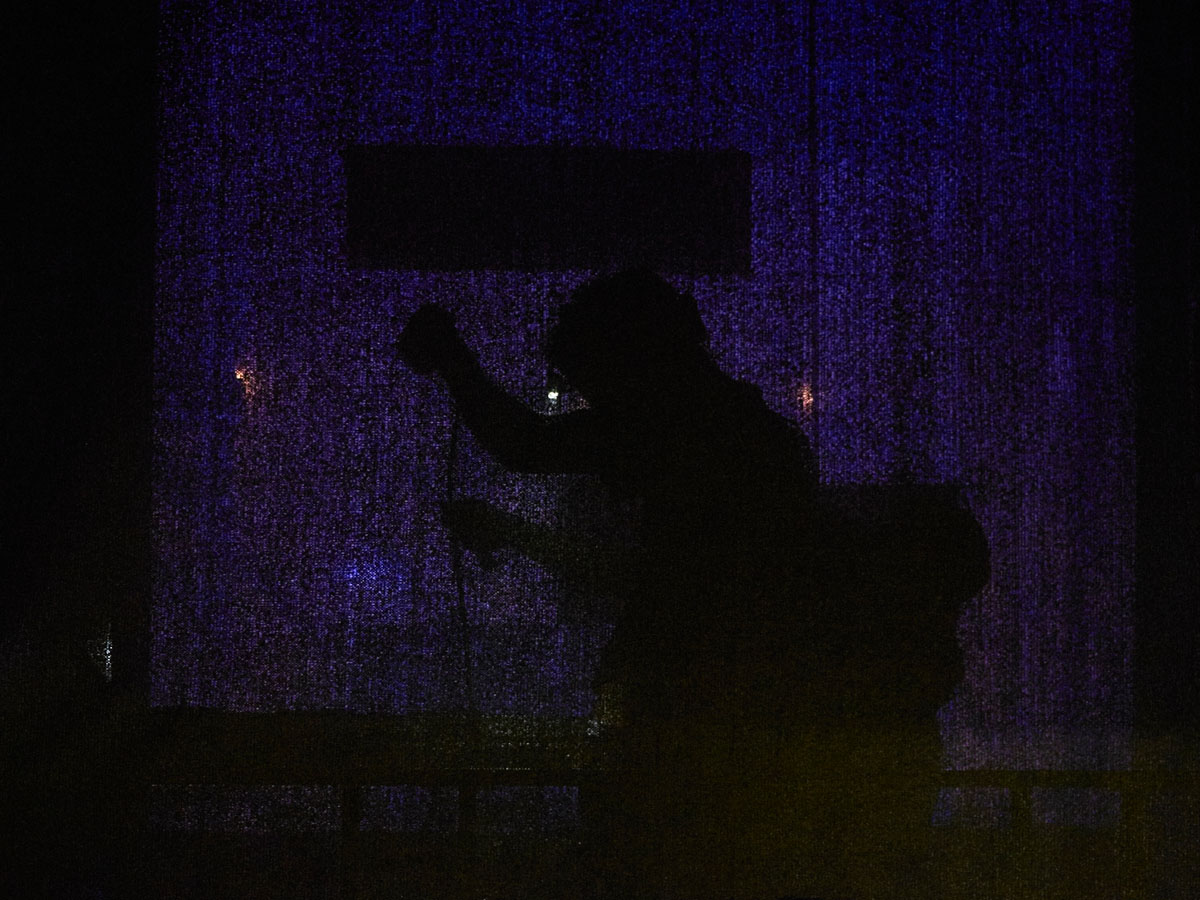
What's the stupidest thing a promoter ever said to you? Maybe also in the earlier years.
J: Haha this one guy in Seville was crazy! We came to a club and Benni was very disappointed because the technician guy of the club was not able to speak English. But since I’m from Spain, I said: „No problem, I can do it.“ Then I ordered my DJ-table and they were like: „No no, we don’t have something like that.“ „But we are booked here and you received our tour rider, you have to have this!“ And we also had to play in like half an hour. I was like: „What the hell?“ and got really nervous and anxious.
J: I went backstage and found another guy and I asked him if he had a table, because we had to play soon and that we’re Kid Simius. He was like: „Oh yeah, Kid Simius, I have a table over there, just come with me.“ I went with him and he had this massage table. One with the hole at the end for your face. I asked him if he was serious and he was like: „Yeah man, of course.“ He was a little disappointed. We tried to set up our stuff there but… We made the best out of the situation.
J: We also had to play two shows, and some people saw both of them and said that the second one had really crappy sound.
They also didn’t have a mixer for the FOH-guy, so we had to plug everything into my mixer to send it out to the big speakers. I then thought it was too quiet and turned to volume up and it distorted everything. But I wasn’t really able to hear it, because I also had shitty monitors.
Now that we think about it we laugh…
M: Benni is still pissed!
You say that you’re nervous before every show, is that something that bothers you?
J: No, no! It makes me stay concentrated and focused on the show. Sometimes I say, that if I’m not nervous before a show anymore, I will just quit, but it just really depends if it’s positive or negative nervousness. Sometimes I’m just scared. Will the people like my music? Will I play correctly? Will there be good vibes on the floor? Sometimes I also just get really excited to play the show. I like it.
M: He gets very, very nervous, like crazy nervous. When I see him so nervous, I get really chilled because he takes that with him and I just laugh.
Are the thoughts you have before every show the same?
M: The source? Tell me about the source.
J: Which sauce?
Thoughts! Not the source, the thoughts!
J: Ah, the thoughts!
Yeah, sorry, east-german English.
M: Ah it’s all good, we’re from Italy.
Everybody laughs
J: The thoughts, no.
M: Sometimes you think about stuff that has absolutely nothing to do with the show. Things from your life, that just happens to me from time to time. Sometimes I just go out of the show, in the show sometimes. Stuff like: „Did I turn off the washing machine?“
J: Sometimes I ask myself: „What the fuck am I doing here?“ Haha!
We get interrupted by people who want to take pictures.
M: That's what happens every day. People ask for pictures or stop him in the streets. I’m fucking tired of this. They should just start paying us or at least take a picture with me, too.
The people leave
M: Bye guys, I also play with him. We'll see you later! We'll take a picture after the show!
Do you sometimes fight because of that? Now that you’re on stage together, but all the attention goes to Jose.
J: I don’t think so. I think it's clear what everybody is doing.
M: I don’t care.
We get interrupted again to take pictures.
M: Oh shit! These are the moments I hate. Two pretty girls. Actually, I don’t like to take pictures. Jose sometimes goes to the front after the show, but I don’t like it.
Can you imagine that ever happening? I mean, you have your own project.
M: Yes, of course, it could happen. If that gets bigger, I still would not go to the merchandise booth to take pictures. I mean, if somebody asks for it, of course, I would do it, but I try to avoid it.
J: I wanted to tell you a story about this one time I played with Marteria at Dockville Festival. It was the year James Blake released his first album and we were really big fans. He was in the backstage and we wanted to take a picture with him. So I went first, and we took a picture, then another fan made a picture. Then Marten went up to him and he just said: „No, no more pictures!“ And Marten said to him: „Yeah, it’s really annoying to take pictures, right? It costs you a lot of energy.“ He didn’t say anything and just went away.
Sometimes it’s hard to get the crowd on your side. How is the experience for you, when you’re on stage and feel like: „Shit, it’s not working.“
J: Sometimes you just have to be able to laugh about yourself, because sometimes you want to move the crowd and we make certain moves like clapping and then the people are still doing nothing, it feels really embarrassing. You have to be able to get through it and just laugh about it. When I go to concerts, I also don’t start clapping or anything like that. Some people like it and some do not. Just try to laugh about yourself..
Do you keep on doing it, or do you get to a point where you just say „Fuck it“?
M: When we start a show, we try to start strong and powerful.
J: Sometimes the first song gives us the direction of the show. You can see if the people are there and you get the feeling that it’s going to be amazing, then we know that we can do whatever we want. If not, we try to find the right direction. But we don’t have to be clowns. We still make music. We are also not in the position to tell the people what they have to do.
But do you look them in the eye and see them as single individuals?
J: If we see them in the eye and they are dancing, then we are happy. But we had a show in the east of Spain... That was probably the worst experience we ever had on stage. It was kind of a village party. There was not this concrete kind of audience, where you could say they like techno or whatever. It was mixed and they just wanted to drink alcohol and have fun, which is also not bad. But we went on stage and started playing. I then went to the front of the stage to cheer them up and a lot of them were showing the finger.
M: Not a lot, but some of them.
J: Yes, like 10 of them. But positive reactions don’t have the impact that negative reactions have.
If you’re playing in front of 2000 people and they’re all screaming, you’re really happy. But if 10 people from the audience flip you off, you get the feeling that you played a bad show or something.
Same goes for comments on Facebook or Instagram. Just one negative comment fucks you up. Like I said, in the end, it’s important to laugh about yourself.
Do you lose the connection, the bigger the crowd gets? Like when you compare a Marteria show to Hurricane, where you play in front of 20-30.000 people.
J: When I’m playing with Marteria, I don’t have this frontman focus, so for me, it is easy to just play the keyboard, dance and have fun. We also play with in-ear-monitoring, so we don’t hear that much.
But in the end, we always just do our thing.
Maybe sometimes the crowd is too far away from the stage, it’s like you're playing in front of a television.
M: You feel a bit isolated. Which is crazy, when you play in front of so many people.
J: Over here, it is more of a punk feeling.
M: I don’t really like playing in front of more than 3-4.000 people.
J: We don’t play that often in front of such big crowds.
M: I do!
How do you come down after big shows or a long tour? Not necessary when you get home, but also when you’re all of a sudden alone in a hotel room.
J: When I’m on tour, I really like to be alone in the hotel room, to be honest. You are talking to many people all day, you also have a lot of fun, but I just like to have a few hours for myself. Now I have a family at home, coming back from the tour you have to be there for your family, you have to do other stuff.
But what about the emotional part, right after a show? Is there an emptiness you have to deal with?
J: This is very difficult. But to have a family and a girlfriend, it really helps you realize what's important and what's not. I’m there for them and everything else comes second. But in the beginning, when I started to play big shows, we thought we were the Rolling Stones and started to do lots of crazy stuff. It took a while to understand that it is just a momentary thing. When you’re on stage for one hour, you feel really good, but after that, you still have to work to get the feeling again. If you just feel and act like that the whole time and just do stupid stuff, it takes one year and you’re out of the business.
In the documentary, you mentioned that you sometimes feel alone. Even though you are surrounded by thousands of people.
J: Of course you sometimes feel alone. But I have to say, during that time I had a bad period somehow, so I was feeling sad sometimes. But this is the reality. Sometimes you just feel like you’re a clown.
No matter if you’re sad, happy or lonely, you just have to go on stage, and at least look like you’re happy and having fun somehow.
J: You just have to be professional. It doesn’t matter if you’re a bigger or smaller artist. In the end, it’s important that you have a family and you’re able to play shows, you’re able to make music, and that is the most important thing. Everything that comes after that, it really doesn’t matter.
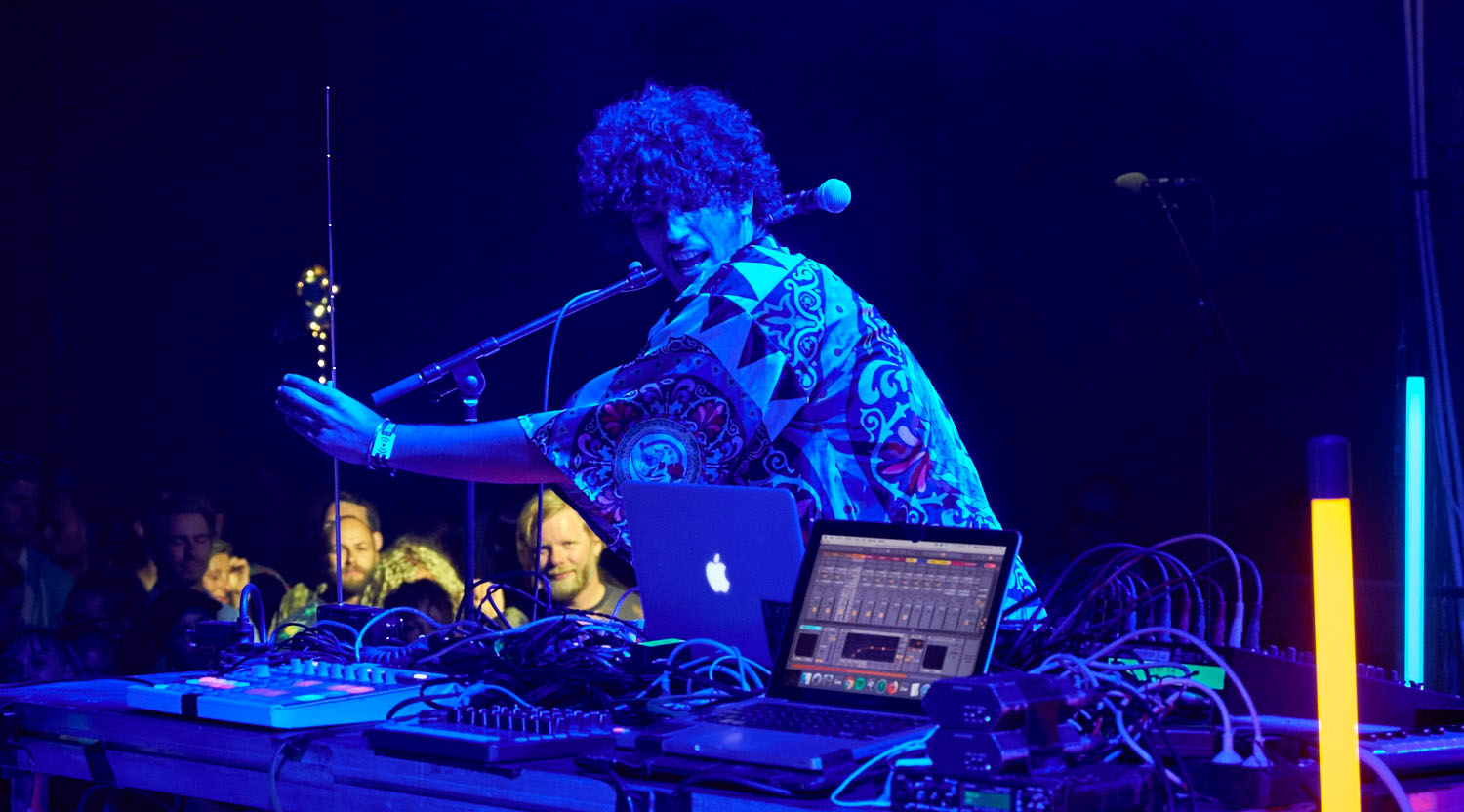
How important is playing live to you? Would you rather be staying home more?
J: I think it wouldn’t work. At the moment I really enjoy playing live. We had a lot of troubles when we started rehearsals for our new live show. We now had a lot of songs to play. We then had to choose which ones we were gonna play on that hour. It was really stressful for me in the beginning, to not have a show ready but we were already booked for shows and festivals. But we worked a lot on the live show and we are really happy and proud of it. And that is amazing. We go on stage and are really free because we know what we want to do. And it also makes me very happy to see the reactions of the people. That's something that I wouldn’t have if I stayed in the studio the whole time. The direct feedback of the people. This, to me, is really, really important.
I criticize myself a lot, which is not very good for my head, but I learned to deal with it and now I’m really happy because everything is as I expect it to be.
If you think back to your first solo show in Germany, was music already a career option back then? What was your personal situation at the time?
J: To be honest, I didn’t have any perspective. If you’re at the beginning of your twenties, you don’t think about that. You only think of how awesome it is to go to a studio, and how awesome it also is to go on stage. You don’t think about a career, but you get older and older and you think more about what you’re going to do, what comes next.
Was there a point where you asked yourself, what am I going to do in the next ten years?
J: If you know what you want to do, you already won. It doesn’t matter in which form. I always wanted to make music, I knew that. Being successful is another thing. If in the next two years I weren’t able to make money from my music, I'd obviously have to look for another job, but I’d still make music. I’m a musician and an artist, I have made music my whole life. It’s not like I’m going to stop, because I don’t make any money anymore. I just have to do it.
Do you have a plan for the year 2025?
J: No, I have a plan for this year and next year. Back in the days, it was more day by day. The more fans I get, the more I don’t want to lose them. I still try to surprise myself in the first place, but I also don’t want to disappoint my fans. If I’m happy with it and they’re happy with it it’s cool, but if they don’t like it, there is nothing I can do about it. I want to be myself the whole time. In the end, surprising myself in the studio and surprising myself on stage will be the things that make me happy my whole life.
